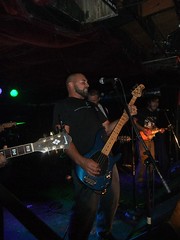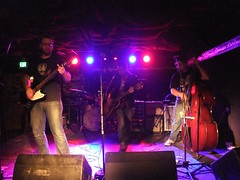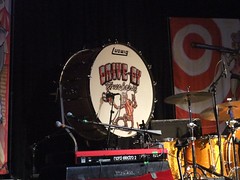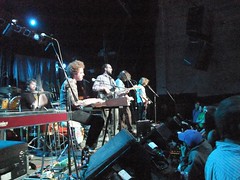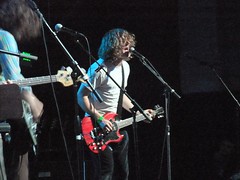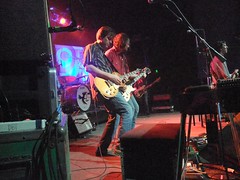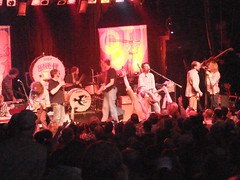Landmark country music act may be raw, but broke down walls
 Important does not necessarily equal good. There’s no argument that the band Lavender Country was important. As the first openly gay country band, they were defacto activists, challenging both stereotypes and their audiences. They made a big regional impact with performances in their home town of Seattle and their eponymous 1973 album, but they didn’t receive national recognition at the time. When their work was rediscovered in 2000, Lavender Country found a home in the Country Hall of Fame archives in recognition of their significance.
Important does not necessarily equal good. There’s no argument that the band Lavender Country was important. As the first openly gay country band, they were defacto activists, challenging both stereotypes and their audiences. They made a big regional impact with performances in their home town of Seattle and their eponymous 1973 album, but they didn’t receive national recognition at the time. When their work was rediscovered in 2000, Lavender Country found a home in the Country Hall of Fame archives in recognition of their significance.
The band’s frontman Patrick Haggerty was just the kind of interesting character to pull off this kind of groundbreaking step. He had a supportive father who advised him not to sneak around, and later he became active with the Gay Liberation Front. Politics aside, Haggerty was driven to catalogue his version of the gay experience with a simple, down-home country style. Speaking directly to his gay audience, he blended twang with a sweetly camp attitude on songs like “Come Out Singin’”, “Cryin’ These Cocksucking Tears”, and “Back In The Closet Again”. In the wake of the Stonewall Riots, but well before Gay Pride made national waves, Lavender Country provided a new voice that was all the more remarkable for being rooted in a traditional country sound.
The album opens with Haggerty’s chipper tone on “Come Out Singin’”, “Wakin’ up to say/ Hip hip hooray, I’m glad I’m gay,” but he bounces around from the minutia of sharing a life with another man to dealing with self-hatred and repression. It’s impressive that he sings so plainly about these issues, especially on the more serious songs like “Waltzing Will Trilogy”. Recounting the horrors of an era where homosexuality was listed as a pathology in the DSM to be treated with electro-shock, medication and institutionalization, Haggerty decries the injustices committed by the medical establishment, “They call it mental hygiene but I call it psychic rape.” His verses present a series of case studies to make his point and, from a purely rhetorical point of view, Haggerty accomplishes his mission. But there’s a fair amount of cognitive dissonance on display, too, and that’s one half of Lavender Country’s Achilles heel. The uptempo “picking and grinning” music sets a rollicking soundtrack for the brutal subject matter. The darker themes on this album rarely find suitable musical accompaniment.
The project’s execution is flawed, even though this kind of raw hillbilly country music is not technically demanding. Performers like the Carter Family have created great beauty within the context of simple melodies and arrangements. Unfortunately, Lavender Country comes across as amateurish. The rough piano work is out of tune honky-tonk, and the keyboard-driven rhythms can be stiff. On top of that, the fiddle player often meanders in search of the right pitch. Haggerty’s reedy voice hits the right notes, and his lyrics can offer a surprising turn of phrase, but those are rare gems. With the bulk of his attention on his message, he seems willing to live with awkward scans and trite rhymes. I can’t blame the band for their priorities, because more polish would not have made these songs any more of a mainstream success at the time, but the rough production makes this a hard album to sink into.
The two best tracks are the mournful folk of “Georgie Pie” and the odd-duck song “To A Woman”. This latter is not really country at all. Instead, fiddle player Eve Morris does a phenomenal job singing a progressive folk love song. Her rich, warm voice caresses the lines and she captures the art rock sound on which Renaissance would later build their career. It’s a remarkable track that doesn’t belong with the rest of the material. I’m guessing that it was the band’s consolation to Morris in recognition of her vocal talents.
Like the rest of American society, the ‘70s were a period of upheaval and falling walls for country music. Around this time, Kinky Friedman and his band the Texas Jewboys recorded Sold American, a humorous Jewish-slanted version of country music. Pot smoking hippies also found their way into the country tent, but it’s interesting to note that it would take another 20 years before another band would directly follow Lavender Country’s trailblazing path. Doug Stevens and the Outband made their own splash in the early ‘90s, with Stevens eventually forming the Lesbian and Gay Country Music Association. Since then, there have only been a few travelers along this rocky path, with Chely Wright and Steve Grand as the latest out country performers. For that reason, Lavender Country deserves our attention, and people should check out this significant reissue recording despite its technical weaknesses.
(This review first appeared on Spectrum Culture)
 Important does not necessarily equal good. There’s no argument that the band Lavender Country was important. As the first openly gay country band, they were defacto activists, challenging both stereotypes and their audiences. They made a big regional impact with performances in their home town of Seattle and their eponymous 1973 album, but they didn’t receive national recognition at the time. When their work was rediscovered in 2000, Lavender Country found a home in the Country Hall of Fame archives in recognition of their significance.
Important does not necessarily equal good. There’s no argument that the band Lavender Country was important. As the first openly gay country band, they were defacto activists, challenging both stereotypes and their audiences. They made a big regional impact with performances in their home town of Seattle and their eponymous 1973 album, but they didn’t receive national recognition at the time. When their work was rediscovered in 2000, Lavender Country found a home in the Country Hall of Fame archives in recognition of their significance.The band’s frontman Patrick Haggerty was just the kind of interesting character to pull off this kind of groundbreaking step. He had a supportive father who advised him not to sneak around, and later he became active with the Gay Liberation Front. Politics aside, Haggerty was driven to catalogue his version of the gay experience with a simple, down-home country style. Speaking directly to his gay audience, he blended twang with a sweetly camp attitude on songs like “Come Out Singin’”, “Cryin’ These Cocksucking Tears”, and “Back In The Closet Again”. In the wake of the Stonewall Riots, but well before Gay Pride made national waves, Lavender Country provided a new voice that was all the more remarkable for being rooted in a traditional country sound.
The album opens with Haggerty’s chipper tone on “Come Out Singin’”, “Wakin’ up to say/ Hip hip hooray, I’m glad I’m gay,” but he bounces around from the minutia of sharing a life with another man to dealing with self-hatred and repression. It’s impressive that he sings so plainly about these issues, especially on the more serious songs like “Waltzing Will Trilogy”. Recounting the horrors of an era where homosexuality was listed as a pathology in the DSM to be treated with electro-shock, medication and institutionalization, Haggerty decries the injustices committed by the medical establishment, “They call it mental hygiene but I call it psychic rape.” His verses present a series of case studies to make his point and, from a purely rhetorical point of view, Haggerty accomplishes his mission. But there’s a fair amount of cognitive dissonance on display, too, and that’s one half of Lavender Country’s Achilles heel. The uptempo “picking and grinning” music sets a rollicking soundtrack for the brutal subject matter. The darker themes on this album rarely find suitable musical accompaniment.
The project’s execution is flawed, even though this kind of raw hillbilly country music is not technically demanding. Performers like the Carter Family have created great beauty within the context of simple melodies and arrangements. Unfortunately, Lavender Country comes across as amateurish. The rough piano work is out of tune honky-tonk, and the keyboard-driven rhythms can be stiff. On top of that, the fiddle player often meanders in search of the right pitch. Haggerty’s reedy voice hits the right notes, and his lyrics can offer a surprising turn of phrase, but those are rare gems. With the bulk of his attention on his message, he seems willing to live with awkward scans and trite rhymes. I can’t blame the band for their priorities, because more polish would not have made these songs any more of a mainstream success at the time, but the rough production makes this a hard album to sink into.
The two best tracks are the mournful folk of “Georgie Pie” and the odd-duck song “To A Woman”. This latter is not really country at all. Instead, fiddle player Eve Morris does a phenomenal job singing a progressive folk love song. Her rich, warm voice caresses the lines and she captures the art rock sound on which Renaissance would later build their career. It’s a remarkable track that doesn’t belong with the rest of the material. I’m guessing that it was the band’s consolation to Morris in recognition of her vocal talents.
Like the rest of American society, the ‘70s were a period of upheaval and falling walls for country music. Around this time, Kinky Friedman and his band the Texas Jewboys recorded Sold American, a humorous Jewish-slanted version of country music. Pot smoking hippies also found their way into the country tent, but it’s interesting to note that it would take another 20 years before another band would directly follow Lavender Country’s trailblazing path. Doug Stevens and the Outband made their own splash in the early ‘90s, with Stevens eventually forming the Lesbian and Gay Country Music Association. Since then, there have only been a few travelers along this rocky path, with Chely Wright and Steve Grand as the latest out country performers. For that reason, Lavender Country deserves our attention, and people should check out this significant reissue recording despite its technical weaknesses.
(This review first appeared on Spectrum Culture)

 It’s a bittersweet pleasure to listen to Uncle Tupelo’s debut album No Depression with 24 years of hindsight. You can hear the band discovering themselves and developing their sound. It’s a snapshot from before the rancor set in. Their label, Rockville Records, hadn’t screwed them yet and the power struggle between Jay Farrar and Jeff Tweedy still lay ahead. Even though the acrimony and split would lead to Farrar’s Son Volt and Tweedy’s Wilco, each of which have made some great music, it’s painful to listen to the band bare themselves in these raw songs and think of what would follow. Their simple sincerity and naïveté made this big impact that the band itself could not outlast and their debut remains fresh and relevant. No Depression captures the beginning of a groundswell that had its roots in the cow punk sounds of X, the Blasters and the Beat Farmers. Tempered by firmer leanings toward folk rock and country, this album has been largely credited with spawning a new genre that never came up with a good enough name; alt-country, Americana or the eponymous “No Depression” have all sat in as labels, but none quite satisfy. Less than a name, it all comes down to the music and attitude.
It’s a bittersweet pleasure to listen to Uncle Tupelo’s debut album No Depression with 24 years of hindsight. You can hear the band discovering themselves and developing their sound. It’s a snapshot from before the rancor set in. Their label, Rockville Records, hadn’t screwed them yet and the power struggle between Jay Farrar and Jeff Tweedy still lay ahead. Even though the acrimony and split would lead to Farrar’s Son Volt and Tweedy’s Wilco, each of which have made some great music, it’s painful to listen to the band bare themselves in these raw songs and think of what would follow. Their simple sincerity and naïveté made this big impact that the band itself could not outlast and their debut remains fresh and relevant. No Depression captures the beginning of a groundswell that had its roots in the cow punk sounds of X, the Blasters and the Beat Farmers. Tempered by firmer leanings toward folk rock and country, this album has been largely credited with spawning a new genre that never came up with a good enough name; alt-country, Americana or the eponymous “No Depression” have all sat in as labels, but none quite satisfy. Less than a name, it all comes down to the music and attitude.
 "Cui bono?” When a record label dredges old albums out of the vault, it’s pretty obvious who benefits. Merle Haggard’s Swinging Doors (1966) is one of four new vinyl reissues from Capitol Records, and it doesn’t take a cynic to figure that it’s an easy investment on their part. The album marked his first time at the top of the Billboard country album charts and it featured a couple of strong singles. But even while I question the label’s motives, I can appreciate that the record showcases Haggard at his honky-tonk best. His later songs, like the anti-counterculture “Okie From Muskogee”, may have helped define his persona, but these simple, heartfelt offerings stand on the bedrock of classic country music.
"Cui bono?” When a record label dredges old albums out of the vault, it’s pretty obvious who benefits. Merle Haggard’s Swinging Doors (1966) is one of four new vinyl reissues from Capitol Records, and it doesn’t take a cynic to figure that it’s an easy investment on their part. The album marked his first time at the top of the Billboard country album charts and it featured a couple of strong singles. But even while I question the label’s motives, I can appreciate that the record showcases Haggard at his honky-tonk best. His later songs, like the anti-counterculture “Okie From Muskogee”, may have helped define his persona, but these simple, heartfelt offerings stand on the bedrock of classic country music. It's been
It's been 

 Sophomore albums are the bane of the recording industry. Band or performers spend years developing their sound and then use up their best material on their debut album. Then they're rushed into the studio to follow up. If their second effort doesn't click, the industry spits them out. There are plenty of performers who overcome, often with the help of the industry, but they're the lucky ones. The indie scene is a little kinder because there's less money at stake, but sophomore albums are often a muddle that doesn't deliver on the freshman hype.
Sophomore albums are the bane of the recording industry. Band or performers spend years developing their sound and then use up their best material on their debut album. Then they're rushed into the studio to follow up. If their second effort doesn't click, the industry spits them out. There are plenty of performers who overcome, often with the help of the industry, but they're the lucky ones. The indie scene is a little kinder because there's less money at stake, but sophomore albums are often a muddle that doesn't deliver on the freshman hype.
 Like broken in boots or comfortably worn jeans,
Like broken in boots or comfortably worn jeans, 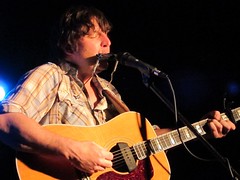


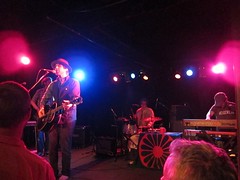
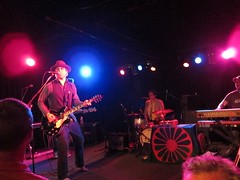

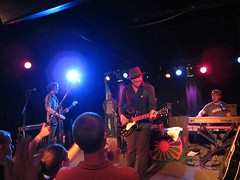

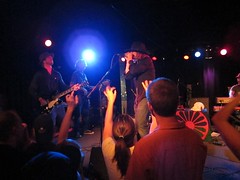
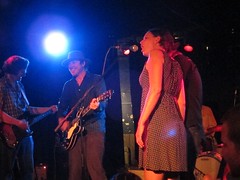

 If there's a brief summary for the characters in
If there's a brief summary for the characters in 








